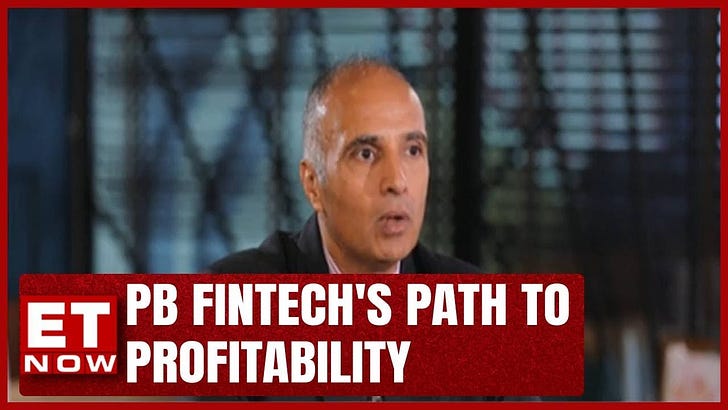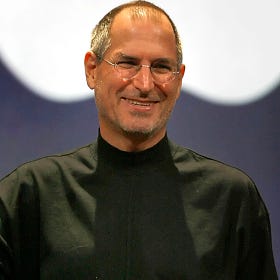A dictionary defines Convenience as- a quality or situation that makes something easy or useful for someone by reducing the amount of work or time required to do something.
That sounds like defining value addition to me.
This thought & conclusion that Convenience as a theme will create some big profit pools going ahead is an outcome of certain experiences, observations and reflections that I have had in the recent times.
It all started with this post around Tech Start-ups Focus on Profitability that I had written back in March’23.
Weekly Insights #5- Tech Start-ups Recent Focus on Profitability & The Investment Setup
At that time, if one would have asked me about my preference around which of the tech start-ups would achieve the profitability first and has the highest probability of doing so; my preference would stack as follows- first PB Fintech, then Paytm and lastly Zomato.
Fast forward six months, reverse has happened, Zomato has actually become the 1st one to report profitability. And that has resulted in the relative outperformance of Zomato’s stock.
What I & many others have underappreciated is the monetizable value of convenience of home delivery that consumers are now used to.
Food delivery platforms are now charging a platform fee of few rupees; Zomato did ~65 crore orders last year, even if it charges Rs10 per order as platform fee, that’s Rs650 crores of straight profit that was non-existent earlier.
And I don’t think any consumer will take the effort to go out by himself/herself to get something for saving these ten bucks.
The value of convenience is much higher than that; consumers are now habitual to getting food delivered.
Recently I was listening to this podcast wherein one of the founders of Zepto shared a very good insight around this shift in consumers behavior from getting just value to value + experience (or say convenience)
See from 57:07-58:40 mins-
Most people including me (or atleast used to) think that something like 10 min delivery is a sort of fad and something that consumers do not really want.
But what we are underestimating is the value & habit that gets built over time as the consumer experience that kind of convenience & service.
Consumers themselves don’t know what they want unless someone gives it to them; and Mr. Damodar Mall provides some very interesting insights around the same (especially the case study of liquid detergents)
See from 11:25-16:30 mins-
There is this saying that alcohol is an acquired taste, and it clearly reflects this behavior of the consumer. Initially one finds alcohol or beer taste bitter, but overtime it becomes something that one cherishes.
So, one never knows what consumers will like unless they experience it and once they experience it & finds convenience or value in it, then they are ready to pay for it and that leads to creation of a profit pool.
Consider UPI as a case study; 5-7 years back no one could have imagined that we will use digital payments for day-to-day things as basic as paying for tea or vegetables on a roadside stall.
But it was the convenience of UPI that led to such mass adoption and though it did not lead to creation of a profit pool on the consumer side, it has created a profit pool on the merchant side with the whole soundbox subscription fees. Which if one thinks about it, is again a derivative of providing convenience to the merchant in terms of accepting a UPI payment.
Someone like Paytm is generating nearly ~1000 crores in annual revenues from just these soundboxes.
Music streaming is another good example of how convenience has led to creation of a large profit pool, which in case of music industry is in billions of dollars.
Consumers are now used to convenience of accessing any song in real time. Don’t see how anyone can go back to old days of downloading individual songs and store them listening; and do this for every new song they want to listen to.
Spotify generates revenues of >$13 billion by providing this convenience to its users; that too with only 46% of users currently paying for this convenience. Overtime, it will be able to get more of its user base pay for this convenience and also get existing users to pay more than what they are doing now; significantly expanding the profit pool of the music industry.
Telecom is another example wherein the consensus belief is that 5G will not add to revenues; however, if one thinks about it, once the users are used to the kind of speed that 5G provides, there will be a section of consumers who will be ready to pay a premium for this convenience of high speed and telecom industry will charge for this and expand its profit pool. Who thinks they can go back to 3G speeds?
We had covered the underlying change in Telecom industry in an earlier post-
The more I think & reflect on this, the more I realize the kind of impact convenience has had in creating profit pools in the last few years and how powerful convenience as a theme is, in its potential of creating substantial profit pools in the coming decades.
In fact, at its core, the entire internet economy has been built on the model of providing a new & convenient way to do things like booking tickets, carrying out financial transactions, social interactions, consuming content, conducting business and so much more; and all of these have either expanded existing profit pools or created new profit pools.
Most of the new technologies or products or services goes from a cycle wherein initially there is skepticism then it becomes a niche and then there is a widespread adoption.
That’s it for this week, new insight coming up next week. So stayed tuned!





I like the way you changed your thought on Zomato. I had the same idea that it would be hard for them to be profitable. But I still have doubt over 10 minute deliveries.